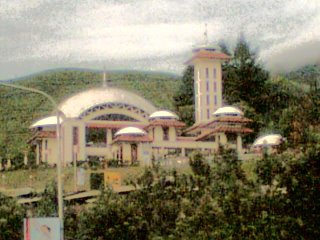
ISLAND OF THE GODS? Maybe so to those whose spirituality is encumbered by symbols. Yes, there are temples – pura, as the local lingo has it – galore. You cannot miss them they are everywhere. There are the private ones and there are communal ones. The family ones are for the nuclear and extended families. Those for the community, meanwhile, can be either local or desa and some are for everyone. The profusion is undeniable, but it’s not a case of familiarity breeding contempt. Most definitely NOT. They, it is, that make the magic; weave the splendour; and, mesmerize the beholder.
The pura is an edifice of immense beauty: of souls realized; spirits celebrated; and, godliness enshrined. In its pagoda-like, towering meru more than the descent of the gods is captured. Herein lies the veneration of man’s supplication to nature and all that is peaceful, tranquil and pristine. As its many tiered roof reaches out to the heavens the meru in its graceful exquisiteness captures best His grace. Simple and beautiful, its silhouette against the twilight sky mirrors a solitary enchantment at once serene and aloof while yet tender and embracing. In the brightness of day, its slender build notwithstanding, the meru stands regal and majestic. It, more than any edifice that is the pura, symbolizes the best in the interaction of man and his surroundings: renewable natural resources used to the greatest effect – the worship of the Divine. Divinely inspired, it is divinity incarnated. That the meru stands in the inner sanctum of the pura is then no accident.
This majesty, regal and never imperious is the embodiment of Divine nature. The loving and merciful Ida Sanghyang Widhi Wasa, the supreme godhead of ‘monotheistic’ Balinese Hinduism worshipped in the most beautiful way imaginable in human terms; in aesthetics of the most refined order. The Hindu temples of Bali do not dazzle; they are enchantingly hypnotic. They do not overwhelm; they comfortingly simple.
In Bali, aesthetics reaches out beyond the bricks and mortar, the wood and alang-alang of its brilliant architecture. No flawless thatched roof, no enchanting carving or perfect sculpture, no ethereal floating pavilions in exquisite landscapes can match the beauty of the Balinese person. Through their eyes and their smiles they bare their souls in a hospitality that is unmatched. Here in paradise there is neither master nor servant. There is here only God and man. Humanity is surrendered. Free will and predestination find an ingenious conciliation in the Balinese spirit. Strength and fortitude sits gentle on the Balinese breast, brow never furrowed with meaningless worry. Hukum karma cradles the Hindu Balinese and drives them always to move on and not dwell on past mishaps. For, in the perpetual motion of change lies existence, which is karma. After all, in the Hindu cosmic energy of birth, death and re-birth, there is an immanent renewal which is not just the preserve of the Hindu. In every individual, Hindu and others, one finds an immanence that promises final liberation from the endless cycle of rebirth and the ultimate attainment of being at one with God. Not being God, mind you, but being at peace with Him.
And so, it is no extraordinary feat and neither is it a defeatist fatalism that, logically, brings on the aside, “If not this life then the next”. It is this that informs the Balinese worldview; the peace with which its constituent member accepts any and all objective circumstance and gets on with it.
Now, in their getting on with it, the Balinese are ruled by the Hindu edict that holds every life dear. Not in a romantic fashion that has given birth to the contemporaneous vegan, the puritan vegetarian. In believing in their idea of the cycle of life there is no harm in making the Earth’s bounty a means to life and neither is there a notion of universal forgiveness that will make retribution impossible. To the Balinese the perpetrators of the 12 October 2002 bombing in Kuta deserve punishment. Not because they are extremists or Muslims but because they are criminals. And, as is the case with every crime the community of the criminals’ origin cannot be held accountable. Therefore, neither the Javanese nor the Muslims, from whence the Bali bombers hail, are resented.
Hence, Bali is synonymous with beauty in all its manifestations. There is beauty in the air filled with aromatic offerings to God; offerings of scented flowers in neat, small, coconut palm frond baskets woven by the women everyday as an expression of their dedication and love of the Divine. Here cleanliness is indeed next to godliness. With very rare exceptions, one almost never comes across uncollected garbage. The streets are swept clean and yet there is no sight of the municipal cleaners. It is the people; they keep their environment near sanitised.
Exotic is a term of insult when applied to Bali! Bali is beatific. If humanity is what it is meant to be, Bali should be the home that every soul knows exists and seeks. It is where every human spirit finds a home. Bali is where a person is at peace, serene and tranquil, earthbound and yet free-floating and light. It is hard to feel weighed down in Bali. Here one feels that the ethereal, that which is difficult to pin down like the slippery, contradictory monotheist concepts of freewill and predestination, is grasped. Here, the one is no longer at odds with the other. In Balinese Hinduism the two have become a complementary whole and thus a totality is fashioned. This same appears to be repeated over and over: paradoxes, the essence of being, is reconciled; and, historical dialectics are no longer the socio-political dynamics that drive human society to its future. There is a sense that the future flows naturally and smoothly from the past and that life is an organic whole, with each atom acting within its destiny to map anew another. The operative word here is “acting”; that of being an agent. Therefore, while surrender to the karmic law is inevitable life is never without purpose.
Here in paradise the other, an other, in fact, every other is without basis. Yes, there is good and evil trapped in an eternal battle as depicted in the Barong dance, which captivates the discerning audience into a trance-like adoration of its profundity, but good and evil is not translated in the elsewhere ubiquitous tendency of seeing these two life forces as embodied in ‘us’ and ‘them’. That the consequence of the latter perception is dire does not bear repeating. Suffice it to say that in Bali that perception has been almost successfully – if ever it existed – eliminated. Visitors coming prepared to embrace the terms of this weltanschauung will fall in love with life as they never could before.
It is only by respecting the warmth of the Balinese and not misinterpreting it as servitude to the tourist trade – undoubtedly the economic mainstay of the island – that a guest will learn of the effortlessness of the local welcome. One is at home, at ease and at peace with the elements and the people. Shame on those who have been to Bali and think that the friendship extended is contrived for economic benefits. The opposite is true: Bali is reaping the bountiful harvest of ‘past lives’ that have evolved into near perfection.
That near perfection is, in all probability, born of an annual ritualistic introspection known as Nyepi, which heralds the Balinese Saka New Year. This is a day of silence and meditation: no talking, no walking, no cooking. The nyepi ritual implies the recognition that good and evil exists within each one of us. Hence, life is the perennial battle which preserves the ascendance of good over evil within oneself: a good that has little use for deprecation, pontification and condescension; and, an evil that pegs itself on the ego. Success is the selfless self that finds expression in work. One must work. One must assist the desa pura to do its best by its congregation. One must have the means to ensure the wholesomeness of spirit, one’s own and that of those one is responsible for, from cradle to grave. No matter where one may be bodily, there is always someone at home making sure of the integrity of one’s spirit. And so, the Balinese is, spiritually at least, never not home.
It is, surely, this deep concern for the spirit that appears to sustain the Balinese soul. Take, for instance, ngaben. There is no mistaking the obligation on the living of cremating the earthly remains of their dead. And, in order to not economically cripple the bereaved the desa organizes, every few years, a communal cremation ceremony. The remains buried in the cemetery – always at the kelod or seaward end of the desa because the Balinese believe that the land becomes increasingly more impure the further it is from the mountains – is disinterred and ritually cremated in a mass ceremony so that the soul is released to be reincarnated in a newborn. The belief is, as it should be, that the dead ought to be on the funeral pyre as soon as possible so that he or she may quickly experience a re-birth. However, the rites of passage cannot be compromised. Hence, the communal ngaben, so that to each soul is accorded its every need.
Is this not then an expression of soul: of kin and community; of solidarity and empathy; of love and sympathy? And so, Bali is unique because she is God’s.
Picture: A pura on Nusa Dua beach, Bali.


